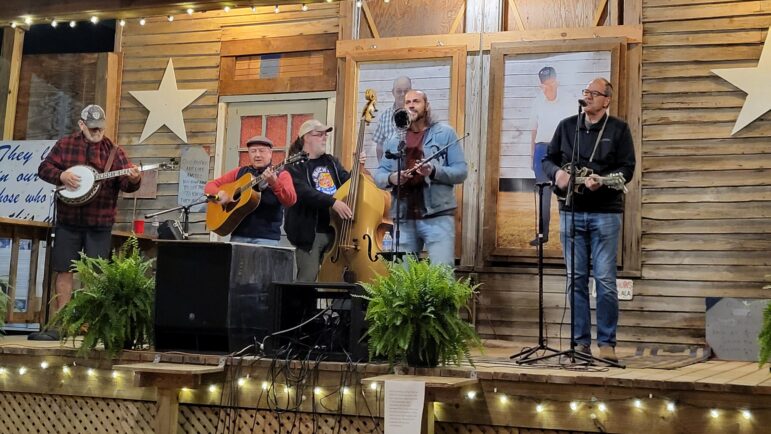By Alli Patton
There’s often a warning that comes with hearing banjos in the distance, a signifier that trouble lies just ahead. When traveling down Alabama’s County Road 2262 this weekend, you’re likely to hear the instrument’s bright twang, but, there, the only threat is that of a good time.
The Henderson Bluegrass Jamboree, a bi-annual event which takes place the second weekends of April and October, is a well-kept tradition among the Southeast’s bluegrass community. From sunup to sundown, picking circles are formed and impromptu jams between strangers-turned-friends permeate the idyllic setting between the towns of Henderson and Goshen.
“We didn’t know how in the world to get here, but we had some general directions,” Rodney Outlaw said of his first time visiting the tucked away event some 30 years ago.
It wasn’t long before the guitarist was hooked.
“We came up here and, golly, fell in love with it from the first day. From then on, I was at every one of them that we had,” Outlaw said.
Since its inception in 1965, the jamboree has brought together casual bluegrass fans and aficionados alike, giving them a space to congregate, play, and simply commune with that high lonesome sound. Thanks to the late Rex Locklar, lovers and purveyors of the American roots genre have found a home.
Wiley Locklar, Rex’s younger brother, has helped to oversee the event these last few years.
“We’ve got people that came to the first bluegrass they’re still coming,” Wiley said. “We got people that plan their vacations by the bluegrass.”
Roots from a legend
Wiley has witnessed the jamboree grow over the last 60 years, recalling how Rex transformed an old schoolhouse their father had built in the 1920s into a local square dance hall and eventually the center for this event. Its musical journey, though, goes back well before the festival.
Wiley remembers how that very building hosted a then-little-known country artist and nearby Butler County native – a man by the name of Hank Williams.
“He stopped by one of my dad’s old businesses uptown and wanted to know if he could put on a little show down at the schoolhouse,” Wiley said. “Daddy said, ‘Yeah, how much will you pay us?’ And he said, ‘Well, we give you all 60% and we get 40% of the take.’ … He had a full house, a big show.”
Williams came back to the Locklars about a year later, newfound fame in tow, and wanted another turn playing the schoolhouse. He, however, had one stipulation, according to Wiley.
“He said, ‘Well, our rates have changed.’ He said, ‘We get 60% and y’all get 40% this time.’”
The schoolhouse is just a whisper today, a tornado having taken with it much of the structure years ago. Now, the jamboree takes place around what’s left of the building, a stage for nightly performances abutting what remains.
Maintaining a legacy
When Rex died in 2014, Wiley’s big concern was being able to keep the jamboree alive without its founder.
“I told them, ‘As long as you keep the fans coming, the musicians coming, we’ll do it,’” he said. “‘But when it starts going down, I’m gonna shut it down.’ I just didn’t want it to kill Rex’s legacy.”
Rex’s legacy, however, seems to be entwined with the very tenets of bluegrass. Tradition, joy, community, and a commitment to lifelong learning – they’ve existed as the framework of the Henderson Bluegrass Jamboree since the very beginning.
Rodney Outlaw says that while Rex’s absence has been felt deeply every year, the bi-annual affair has remained consistent in those ways. And a recent passing of the torch has hopefully ensured its longevity for years to come.
“There’s a new generation of pickers, good pickers, and they are coming on up through the ranks,” Outlaw said. “They’re carrying on the old tradition of bluegrass … It’s a real blessing to us all the old timers that are still here.”
As leadership changed hands earlier this year, guitarist Colby Carlock was among the group that headed the call. He’s been an attendee for the last decade, helping run sound for the past couple of years, and when the opportunity arose, his answer was simple.
“Somebody’s gotta do it, so why not us?” Carlock said. “I never met Rex myself, but we met everybody else, and you just become part of a family. You hate to see it go, so we just kept it going.”

